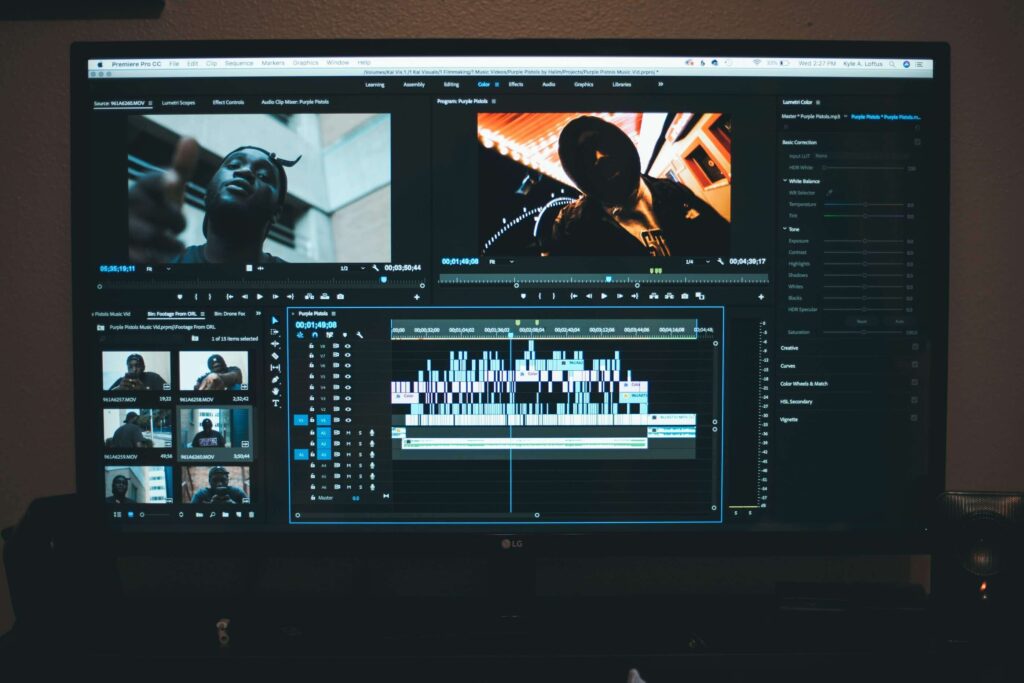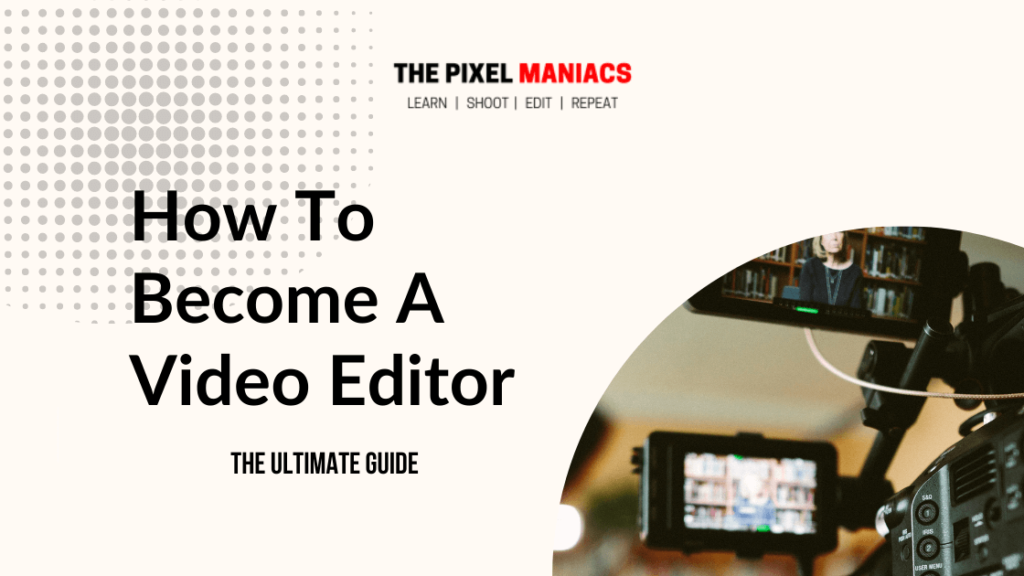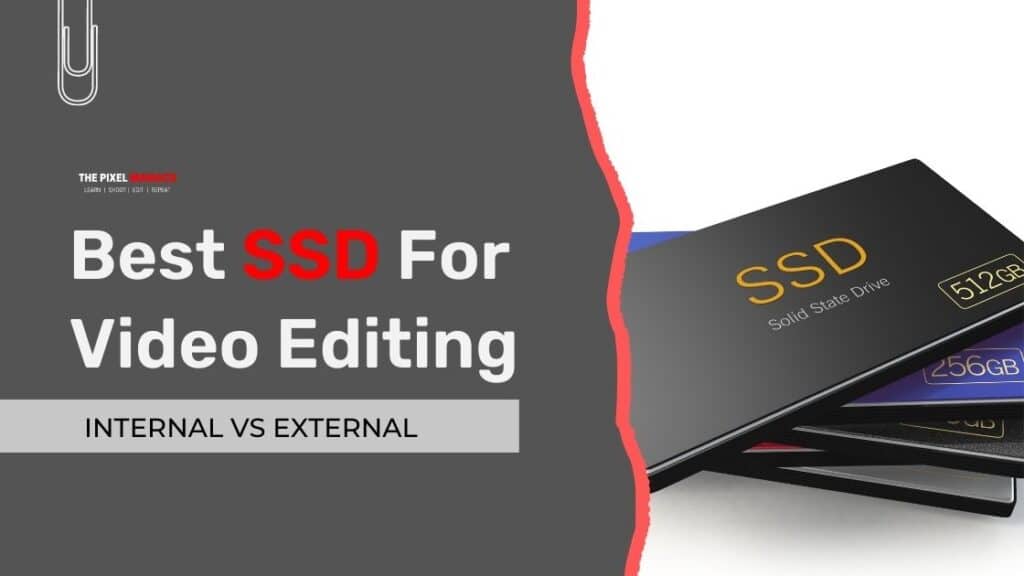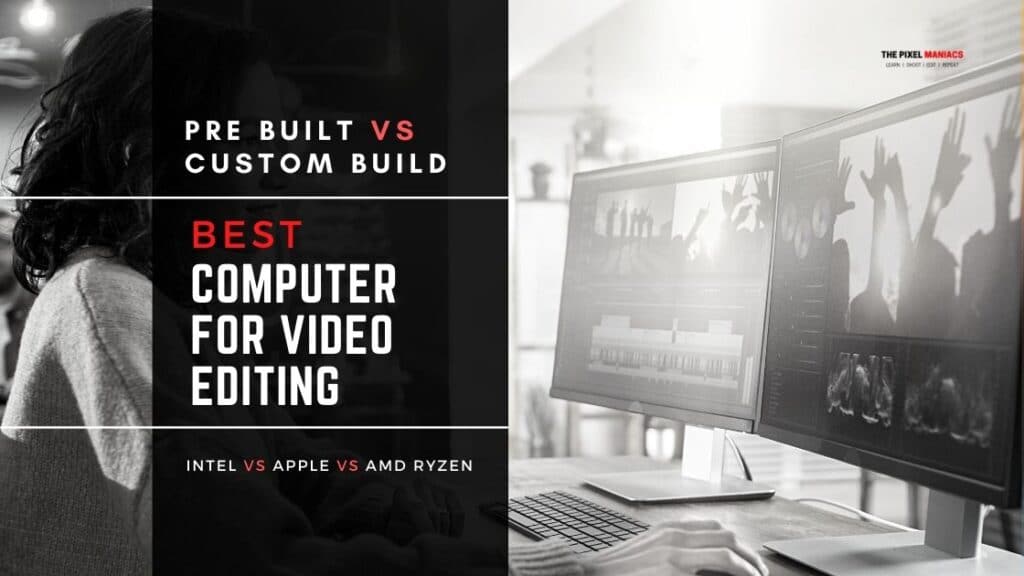You probably didn’t enjoy the last show you watched because of a video editor. Contrary to popular belief, video editors play an important role in the media industry.
Video Editors are responsible for making sure that all videos look professional and have great quality. Video editing is not as easy as it may seem. It takes training, practice, and experience to be able to create good content. But if you’re creative enough, why not give this career path a try? Lets answer this Question in our article on how to become a video editor.

- Things to consider before becoming a video editor
- Understand what a video editor does
- Determine whether you want to do it as a hobby or a career
- What do I need to become a video editor?
- Where do I learn video editing?
- How to get into video editing as a career
- FAQS
- Conclusion
Table of Contents
Things to consider before becoming a video editor
Before you decide to pursue video, music video editing, as with any other career or goal, there are a few things you should consider.
This is one of the most important questions you’ll ask yourself when deciding what kind of job you’d like to have.
Do you want to work at a company? Are you looking for a more flexible position? Or would you rather start your own business?
If you’re interested in working in the entertainment industry, then you might want to think about becoming a video editor. There are many different jobs available within the field.
Most editors start out as production assistants, then become editing assistants or apprentices to senior editors in production studios and broadcasting stations.
Understand what a video editor does
First and foremost, you should become acquainted with the job description of a video editor.
Simply put, a video editor is responsible for ensuring that the story in a video is told most compellingly and interestingly possible.
A video editor’s job can range from as simple as using a simple video editing software to make small changes on a short video clip to as complex as compiling and editing a series of video footage into a movie or documentary.
A video editor’s job entails all the activities required to convert a raw video clip from the film crew into the final product shown to the public. The following activities listed below are part of a video editors’ job:
A video editor’s job is broad, but it becomes relatively simple over time with the proper training and experience.
The training is more than just a 5-minute crash course in video editing and can span anywhere from two months to a year. Most people start things and then quit because they don’t fully understand what it takes to succeed.
Determine whether you want to do it as a hobby or a career
Some people do certain activities as a hobby or side hustle, while others may decide to do it as a full-time job.
This is most common in non-professional courses such as photography, video editing, and so on.
It would be in your best interest to decide what video editing is to you, as this may be a factor in determining the amount of effort put into its success.
Video editors, like content editors, come in a variety of styles. Because the video editing niche is large, there are numerous specializations in the field, though it is possible to master more than one technique. Some of the video editing techniques that set editors apart are:
Know different Styles of video editing
There are numerous editing techniques available. However, we will not go into great detail about them in this article.
Please return here later to learn more about the various types of editing.
Check the Availability of jobs in your field
Video editors can work in a variety of scenes and places. Almost any commercial process involving a video camera requires a video editor. Some of the most common jobs and events where video editors are required are:
Know the Prices of your toolset
Every successful video editor has a fantastic toolkit to work with. Even the most inexperienced video editor will require a basic kit that includes a laptop, editing software, headphones or speakers.
Best Computer for Video Editing
We have dedicated an Entire Article on How to Choose the Best Computer for Video editing, Do check it.
Amazon and eBay have a variety of offer listings where complete video kits can be purchased for as little as $69. Free video editing software for your computer, such as Lightworks, Viva Video, Adobe Spark, and Davinci Resolve, can also help you get started.
You may decide to upgrade to a more expensive toolset and paid software as your skillset improves.
Qualification and training required to become a video editor
Film School vs Non Film School.
Film School
Months of training are required to become a successful video editor, after which a certificate will be issued based on your performance.
Training can be difficult for some people, so it is in your best interest to understand what it entails and how long it will last.
Corporate Video Editors generally Look for The Certificates and Filmschool Background.
Self Learning ( Non Film School )
Any one Can Learn Video Editing but if you truly want to become a Video Editor there is no better way than to learn it by doing hands on Projects.
If you have the Instinct to edit, just go for it, Start Small and grow steadily.
Build a Portfolio slowly, work for Experience rather than for money. especially in the early phases of your video editing career.
What kind of video editor do you want to become?
There are various types of video editors, with each classification based on the nature of their work. Among the different types of video editors are:
As the name suggests, a film editor is in charge of editing films, movies, documentary clips, and other media.
A film editor’s job typically entails compiling raw footage from the film crew and synchronizing it into a final product ready for viewing by the audience.
Everyone is familiar with YouTube videos, but few are aware of the time and effort required to create YouTube video content.
A YouTube video editor is responsible for ensuring that the story of the video is told compellingly by editing out parts of the story, incorporating music and voice-overs where necessary, and, most importantly, improving the audio and video image quality.
Nothing turns off an audience more than a poorly produced video.
Weddings are memorable events, and many couples want video memories of their special day.
A wedding video editor is more of a summarizer because wedding videos are usually relatively short, sometimes as little as a 5-minute clip.
The job of a wedding video editor is to select the most memorable events from the day’s footage and organize them into one seamless video story.
Corporate videos are typically videos used by businesses to raise brand awareness. They can take the form of advertisements, campaign launches, or even being embedded in newsletters.
A corporate video editor’s job is to ensure that the final video is consistent with the company’s tone and brand.
Job as a Freelancer or in a corporation

Video editors are typically either freelancers or employees of corporations.
Video editing freelancers work on a per-job or per task basis and are usually employed on a short-term basis or at most for the duration of the gig.
Freelancers leverage various online and offline platforms to seek jobs. Online platforms such as Upwork, Fiver, and Appen are great platforms where freelancers can find different video editing jobs.
Offline platforms involve going from one gig or event to another and marketing your skills to the hosts. Available offline gigs can include helping YouTubers or social media influencers to edit their videos.
Video editors working in a corporation are usually employed by media corporations like Tv stations, Cable networks, and film houses. These corporations have long-term jobs available for video editors due to the constant demand for their services.
Payments are made on a monthly or weekly basis, depending on the arrangement and position offered.
For example, video editors in high-ranking positions in the corporation can earn as high as $68,000 annually, which equals about $5,666 monthly. Starters or entry point video editors can earn as much as $34,000 annually, averaging $2,833 monthly.
The difference between a video editor working as a freelancer and one working in a corporation is their salary structure and mobility.
The freelancer has a variable earning structure that depends on the amount and type of gig obtained. At the same time, the corporate video editor receives a fixed salary plus or minus any bonus or deductions.
Another difference is that the corporate editor is limited to the company’s location, while the freelancer can quickly move to different places in search of greener pastures.
What do I need to become a video editor?

When it comes to video editing, the laptop plays a critical role. It is used to assemble raw footage clips and run the software used to edit and work on videos.
Feel free to check back here later for more information about suitable Laptops or PC.
Video editing will require you to sit at a desk for long periods. A comfortable desk can help you work less stressfully while also preventing bad posture.
Please return later to this page later for additional information on desks.
The video editing software is the brains of the operation. The software is in charge of cutting, editing, and incorporating special effects into the finished video.
Please return to this page later for more information on video editing software.
You may be wondering, “Why do I need a high-quality monitor when I have a PC?”
The simple answer is that a monitor has a higher resolution than a PC and would be useful for projecting video on a large screen to allow you to work properly.
For further information on monitors, please return to this page later.
The video’s sound quality is just as important as the video itself.
The importance of a good pair of headphones or speakers cannot be overstated unless you are working on a muted video.
The headphones allow you to appreciate and work on the video’s sound properly.
Please return to this page later for further information on Headphones and speakers.
Where do I learn video editing?

Video editing is a skill that requires extensive training, mainly on-the-job training, before you can master it.
Recently, several organizations have begun to show interest in video editing by offering professional video editing courses.
Let’s look at some of the organizations where you can learn to be a video editor.
YouTube has recently emerged as one of the most popular tutoring platforms for a wide range of subjects.
YouTube has a plethora of how-to videos on virtually any topic you can think of.
There are a variety of free and paid video editing classes available on various YouTube channels.
We discovered some free YouTube tutorials created by experienced video editors. To begin the tutorials, simply click on one of the links below.
You can also find additional resources on YouTube by searching for the desired content.
Udemy is an online educational platform that offers thousands of courses on virtually any topic.
Udemy has a variety of excellent online courses that can teach you the fundamentals of video editing, with the option of earning a certificate at the end of the period.
Some of their video editing course include:
Each video editing class costs about $89, including certificates, and is an excellent value for money considering that you get a certificate after the course.
Consider Udemy to be an online college where you can learn from the comfort of your own home.
Click here to get started with Udemy for your video editing courses.
For many years, film schools have been the most popular place to learn video editing.
As the name implies, film schools exist for one purpose: to transform students/beginners into video editors or filmmakers, as the case may be.
When you are ready to start learning video editing, you can apply to any of the film schools that are available around the world.
Below are some of the most prestigious and popular film schools around the world
The film schools also provide certification at the end of each course section, which is an added benefit.
Coursera, like Udemy, is a marketplace for online teaching and learning with thousands of courses.
The primary distinction between the two sites is that Coursera offers more free courses for beginners who do not have the funds to pay for premium classes.
Some of the free courses offered on Coursera include:
In general, Coursera training can provide a good education, with the option of becoming certified after completing the course project.
You can register for a free course on Coursera by following this link.
The Do-It-Yourself program has been around for a long time and is the method of choice for many people when it comes to learning a new skill.
This method entails purchasing a good book, video editing software, and some content to practice with while on the go.
There are various good eBooks available on amazon which you can purchase to get started. Some of them include:
You can also download some of the free video editing software mentioned above or in the books. These two tools and of course a video content is what you need to start teaching yourself video editing.
This method is typically appropriate for individuals who prefer self-teaching to interactive classes.
You can occasionally conduct additional research on the fly while learning to help bolster your understanding of the facts.
How to get into video editing as a career
Video editing jobs, like any other job, require a certain level of experience from the candidate or applicant in order to be considered for the position.
There are also some positions available for newcomers. These jobs provide the candidate with the opportunity to gain on-the-job training while also working.
Getting a job in one of these positions would be a great way to start your video editing career.
Employers consider years of experience and the available skill set required for the job when reviewing job applications.
Before you begin your video editing career, you should first develop skills that are relevant to your niche. Another important step is to volunteer for video editing jobs or apply for internships that will provide you with the necessary hands-on experience/training.
The two factors mentioned above are critical, and they greatly influence how seriously employers will take you.
A bachelor’s degree in film or related studies will also give you an advantage and help your application stand out from the crowd.
A refined workflow can be the difference between you and a lot of unfinished projects.
Unfinished projects can sometimes appear to be a herculean task to complete.
A refined workflow is a sequence of events or activities undertaken towards successfully carrying out an event, project, or job.
A refined workflow makes the work more straightforward by breaking down and outlining your work process into a series of short, simple tasks which can be easily achieved one after the other.
A video editor’s job, for example, entails compiling and editing videos to create the final product.
A refined video editing workflow can be broken down into the following series of small tasks.
Breaking down your workflow into simple steps, as described above, will make it easier to complete and will provide you with a sense of objectivity while working.
A refined workflow also aids in time management by eliminating the confusion of remembering or figuring out the next step.
Feel free to check out this page later on to learn more about the significance of a refined workflow.
FAQS
Is becoming a film and video editor right for me?
The answer is yes! If you have an eye for detail and enjoy working in front of the camera or behind it, then this could be the perfect job for you. You will need to know how to edit videos using Adobe Premiere as well as other editing software like Final Cut Pro X, etc
You should also be able to work independently without needing constant supervision from others. This means that you are self-motivated and can complete tasks quickly when needed.
How do I get started in video editing?
To get started in video editing, take some training courses required to teach you the skills required, purchase the tools you need to properly edit videos, and get started by practicing on some test clips and this page has all the Resources you need.
What skills do video editors need?
Video editors require a lot of skills; however, the key things to note are:
Do video editors make good money?
Yes, video editors make good money. They have an average weekly pay of about $1300, although the income might vary depending on your job type and location.
Can you teach yourself video editing?
Yes, you can teach yourself video editing. There are several online courses, tutorial videos, and books to help you get started. We have also identified several resources in this article that can help you in your journey.
Conclusion
Video editing is an important skill to have, especially if you work in film production or a communication-related field.
The pathway to becoming a video editor is relatively straightforward and can easily be achieved by anyone with the proper motivation and perseverance.
The key things you need to become a video editor are proper training, a quality toolset, and most importantly, the zeal to learn and work.




